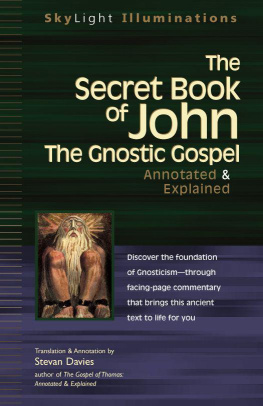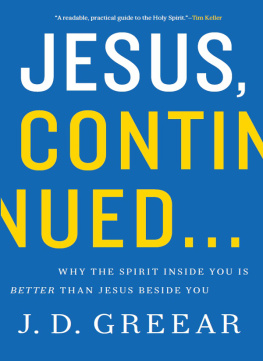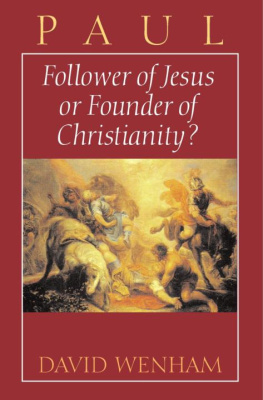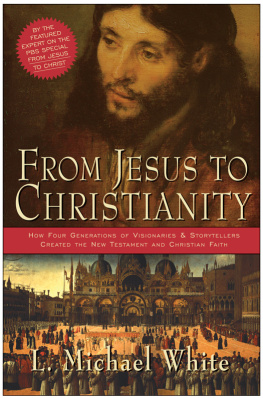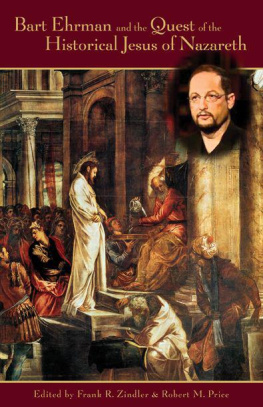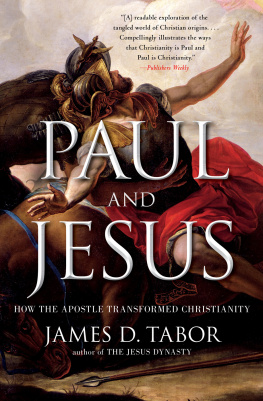Spirit Possession
and the Origins of Christianity
Stevan Davies
Copyright 2015 Bardic Press
Text of Spirit Possession and the Origins of Christianity Copyright 2015 Stevan Davies
Published by Bardic Press
71 Kenilworth Road
Dublin 6W
Ireland
http://www.bardic-press.com
info@bardic-press.com
ISBN 978-1-906834-19-7 (Paperback)
ISBN 978-1-906834-20-3 (Kindle)
ISBN 978-1-906834-28-9 (Hardcover)
Preface
T his book consists of several investigations into the question: How did Christianity begin? Most of the book was written during a National Endowment for the Humanities Summer Seminar at Princeton University. The rest I wrote at Misericordia University. These investigations are united by my conviction that Christianity began as a movement based on the human potential for personality dissociation, explained intra-culturally as the entrance of a spirit-person into the body, which spirit-person takes over the body and the mind for a period of time. This is spirit-possession, a category of religious experience recognized and studied by anthropologists for well over a century, but not a category of religious experience that scholars of early Christianity often seem to recognize or utilize. Their lack of interest is surprising and a bit perplexing because the foundational texts of the Christian movement, i.e. the New Testament, are replete with accounts of spirit possession as the root factor in formative Christian experience.
Perhaps the kind of spirit possession understood as the experience of the Holy Spirit entering into Christian people is regarded by Christian scholars as an entirely different sort of thing than spirit-possession understood as the experience of some other Spirit (African? Chinese? Cuban?) entering into some other non-Christian people. I suppose if you believe that there is a Christian Holy Spirit out there in the real world who does in actual fact enter people, and that all other supposedly divine Spirits do not exist in reality and so do not enter people, you would not want to discuss spirit-possession generically at all. Certainly one can find hundreds of books on the New Testament and the rise of Christianity and the career of the Historical Jesus that tacitly assume that when a Holy Spirit (aka Paraclete) is said to enter into people that this is a sui generis sort of experience unique to Christianity.
I will frequently discuss the experience of the Holy Spirit in the present book. It is, in my considered opinion, the single most important factor in the rise of the Christian religion, and I will show that the principal authors of the New Testament (Mark, Luke, Paul, John, etc.) thought so too. The beginning of the Gospel, according to Mark (whose account is the foundation for the later gospels of Matthew and Luke, and perhaps also that of John) is the event of Jesus experiencing what he believed to be a spirit entering into him. The beginning of the Acts of the Apostles describes the entry of a spirit into all Jesus followers. Paul speaks of spirit experience as crucial to the experience of members of his churches. John has Jesus foretell the arrival of a spirit-paraclete that will function within the members of the nascent church. And so forth.
The essays in this book are several different investigations. They have in common the fact that the experience called the spirit, is a central factor in New Testament accounts of the origin of Christianity. However, my different investigations are not intended to be one self-contained argument. They are approaches to similar questions, but they come from different angles of approach. It may be the custom among authors to make sure that their various approaches to a question are self-consistent and mutually reinforcing, but this book contains differing approaches, some that are not altogether consistent with one another. As such, they are suggestions, ideas, lines of thought, provocations to think differently about the origins of the Christian religion. If you find one part convincing but another not so, that is just as well. I hope readers will enjoy this book and find ideas in it that they can work with and improve upon.
Introduction: On The Pentecostal Origins of the Christian Movement
J esus of Nazareth had very little to do with the initial foundation and spread of Christianity, or so I will argue. Further, I will maintain that the description of the importance of Jesus career as an exorcist, provided and then rejected in the Gospel of Mark, and the vision of the originating Pentecostal impetus of the Christian movement presented in Lukes Acts of the Apostles, are generally correct and that those descriptions of the career of Jesus and the rise of the Christian movement do sufficiently account for the origin of Christianity.
Recently an intellectual movement called Mythicism has received considerable attention. Mythicism argues that Jesus of Nazareth never existed at all. It claims that the Christian movement invented him as a founder figure, a mythical heavenly entity come down to earth. The reports of the sayings attributed to him, and the deeds supposedly performed by him, are entirely invented or mistaken according to Mythicism.
The Mythicists argument is founded on the fact that our earliest surviving Christian texts, the New Testament epistles, show almost no interest in the life or teachings of Jesus. Except for his last week on earth, there is almost no such interest shown in the Acts of the Apostles. Interest in Jesus life story was surprisingly late to develop, and when it developed it did so almost entirely through the reworking and creation of ahistorical legends and miracle stories and, in the case of the Gospel of John, accounts of a divinity come to earth. Indeed, there really are only two accounts, that of Mark and that of John, and the latter may be dependent on the former for its basic narrative. I will endeavor to explain why this was the case, and to show how Christianity first came into being, and why the historical Jesus was of little interest to the first Christians. I am not making a Mythicist argument here, but I do think that the Mythicists have discovered problems in the supposed common-sense of historical Jesus theories that deserve to be taken seriously.
What I will be discussing immediately below will not be surprising news to biblical scholars; it takes what scholars generally know and posits that what they know is correct, i.e. that we know very little about Jesus. And then, reasonably enough, I raise the question: why? If Jesus was the founder of the Christian movement, why did Christians care so little about his life and teachings that they failed to retain reasonably accurate records of them? And why, as time went on, did records of his life and teachings begin to be created out of imagination? What started the Christian movement if Jesus didnt? Or did he found it, but nevertheless his life story and program of teachings had little to do with it? Ill suggest answers to those questions shortly.
Faith that there was an historical Jesus begins with the fact that we have several biographical narratives about his life: the narrative Gospels of Matthew, Mark, Luke, and John, and James, at least two long lists of his sayings, the Gospel of Thomas and Q, and letters by foundational Christians, especially those of Paul and the pseudo-Pauls. Scholars today tend to presume that these materials, while certainly not accurate by the historical standards of the twenty-first century, are good enough for religion work, and as good as you have any reason to expect from people writing so very long ago. But they are not good sources at all for an historical Jesus.


